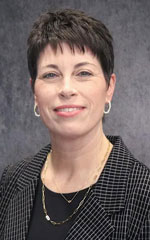By Dr. JUANITA ALBRIGHT
Guest Columnist
 As a doctor, I took an oath to “do no harm” when treating patients. I take the same approach in my role serving the students and parents of Hamilton Southeastern School District as a school board member and this year, as school board president.
As a doctor, I took an oath to “do no harm” when treating patients. I take the same approach in my role serving the students and parents of Hamilton Southeastern School District as a school board member and this year, as school board president.
During the pandemic, Indiana parents got an inside look at what was happening in their children’s classrooms and didn’t like what they saw. Academic excellence took a hit when schools were closed, and since then, we’ve worked hard to revive in-person instruction and address parent concerns.
But when it comes to education, we can always continue to improve. Applying my “do no harm” ethic, I see more work that needs to be done to give parents confidence in their children’s education and improve academic excellence.
One way to do that would be for our state to make school board elections partisan.
Our school board elections are currently non-partisan, meaning in Indiana there is no party affiliation listed next to each candidate’s name on the ballot. Voters have only vision statements and vague campaign promises to help them choose the candidate they think most closely aligns with their values. It is difficult to determine what kinds of decisions candidates will make that will impact our children and their education.
Requiring all school board candidates to declare a party affiliation would, first and foremost, improve transparency – it would give parents and voters more clarity on who they’re voting for in school board elections. “Non-partisan” does not mean non-political. School board candidates, just like every other elected official, have their own biases and ideologies – they’re just hidden.
School board members make key decisions on curriculum, salaries, instruction policies, and staffing – and members oversee millions of taxpayer dollars. Voters need to know the ideological backgrounds of the individuals who will wield this much power in the community. Partisanship in these elections would allow voters to cast a more informed ballot and would help make the school board more representative of the community for which it works.
Voters naturally want to participate when they know more about the candidates on the ballot. Adding party affiliation to school board candidate elections has been shown to increase voter turnout dramatically. For example, North Carolina allows districts to hold school board elections that are either partisan or non-partisan. More people participated in the partisan school board elections – in fact, the participation rate for non-partisan school board elections was five times lower than for partisan elections.
We should do everything we can to encourage participation in school board elections because these elections are so profoundly consequential for our students and our community.
Most importantly, making school board elections partisan will once again focus education where it should be focused – the students. Non-partisan elections can give inflated influence to special-interest groups that may not be student-focused.
Opponents of this reform will claim – and have claimed – that we need to “keep politics out of our schools.” But that’s unrealistic – politics finds a way into schools, whether we like it or not, influencing everything from mask mandates to curriculum choices and more. Just because our elections are non-partisan certainly doesn’t mean the candidates themselves are.
Voters and parents need to know exactly what political beliefs school board candidates hold before these candidates take office and make impactful decisions on our children’s education.
I take my responsibilities seriously – I want academic excellence for my children, for every child in the Hamilton Southeastern School District, and for every Indiana student.
If legislators in Indianapolis feel the same, they should prioritize making school board elections partisan during this session.
Dr. Juanita Albright has practiced medicine for more than 20 years and currently serves as President of the Hamilton Southern Schools Board of Trustees.


Partisan politics never puts anyone except the politicians first.
Dr. Albright’s contention that “It is difficult to determine what kinds of decisions candidates will make that will impact our children and their education” without party labels is only true when entire blocs of candidates refuse to complete questionnaires from media, refuse to participate in public candidate forums, and don’t allow comments and open discussion on their social media pages. Candidates who respond honestly and thoughtfully to questions from the community can make it perfectly clear where they stand. They are also allowed to express a party affiliation if they so choose, it just won’t be on the ballot and won’t be included in straight-ticket votes.
Making party affiliation official in school board elections would only serve to increase transparency if there is an implication of partisan loyalty. It would put a stamp of approval on party funding for school boards, which would only serve to increase pressure on candidates to be loyal to the parties, which is not putting students first.
Thank you Dr. Albright! We appreciate your insight, perspective and leadership!
This is a false premise that Dr. Albright is basing her argument on. To say that school board candidates are only able to socialize their views through the lens of partisan politics, is to say that voters are not intelligent enough to make good decisions in elections. Of course politics plays a role in school board elections, but the reason they are non-partisan is to remove a friction point exactly for the reason she is trying to argue for partisan elections, so the focus in on the students. We live in a world today where information is easily accessible. More so than any other time in history. The burden is on the candidate to make their reason for wanting a board position known. This opinion should be seen as an insult to the intelligence of voters in HSE district, and the state as a whole.
Why is everything about red vs blue? Can we please open our eyes and realize we’re all being putted against each other and this would be one more way to fall into that trap.
This legislation is not the answer to the problem Dr. Albright is trying to solve. I am also frustrated by the politics in our schools, on both sides, but this just doubles down and encourages politics even more. Believe it or not, there are plenty of people who are independent- or can affiliate with a party and still work across the aisle. How are non-partisan or bi-partisan candidates supposed to get elected if they are now running against people who are fully financially backed by the GOP or Dems? Instead of leaning into politics, how about some accountability and rules that keep political parties OUT instead of encouraging them to go all in. No prospective school board candidate should feel like they HAVE to affiliate with a party to win a seat to represent our public schools. It’s bad enough as it is – let’s not take it any further.
Please note that while Dr. Albright includes her title and position as President of the HSE School Board in this column, she is not speaking on behalf of the entire board, and should have made that more clear. Her opinion is hers, and does not represent that of the board as a whole or even the district.
Any school board candidate that is focused on the kids will know you have to consider the ideals and positions of all political perspectives in order to serve all kids. That’s why the focus should be kept on keeping partisanship out.
Indiana School Board of Ethics states following:
A school board member should honor the high responsibility that membership demands by:
Refusing to play politics in either the traditional partisan, or in any petty sense.
I do not agreee with the article and agree the posted comments stating school board candidates should not be partisan. Hopefully the bill fails as it did in 2024.
It’s so disappointing to hear this. If this is how you feel, you should be involved in private education where your views can be aligned with educational choices. There is no place for any adult’s personal political opinions in public education.
Politicians, medical doctors, and school board members all hold positions of public trust and responsibility. While doctors take the Hippocratic Oath to “do no harm” and school board members are entrusted with prioritizing students, no such ethical obligation universally binds politicians.
At their core, all three professions make decisions that profoundly impact people’s lives. Doctors focus on the health and well-being of individuals, school board members ensure students receive a quality education, and politicians shape policies that influence entire communities. Ideally, all three should act in the best interests of those they serve.
However, can politicians truly serve the best interests of everyone? The answer is no. Political decision-making inherently involves trade-offs, where policies that benefit one group may disadvantage another. Politicians often prioritize those who support their campaigns—whether through votes or financial contributions—resulting in governance that favors certain groups over others. Unlike doctors, whose duty is to individual care, or school board members, who are responsible for every student, politicians inevitably “do harm” to those whose interests or ideologies do not align with their policies.
To ensure that all patients receive the highest standard of care and that every student has access to quality education, politics must remain separate from these two critical fields, which serve some of society’s most vulnerable populations.
Dr. Albright should now decide whether her commitment to “do no harm” outweighs her involvement in the divisive politics that have negatively impacted her tenure as school board president.